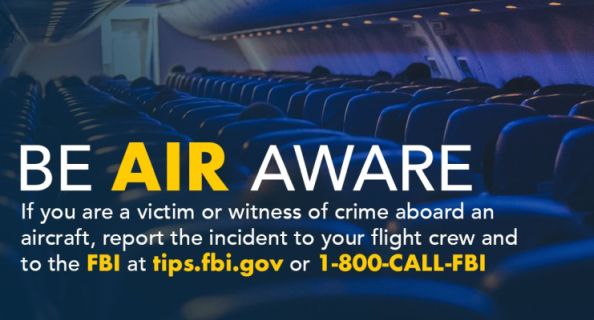
‘Sexual Assaults Aboard Aircraft’ are on the rise: Precautions you should take before and during your flight

(Image credit: FBI)
April is Sexual Assault Awareness and Prevention Month, and our friends at the FBI are taking this opportunity to alert the public about a serious federal crime that is on the rise: sexual assault aboard aircraft.
While sexual assault can happen anywhere, many people who fly while traveling do not realize that sexual assaults can and do occur on airplanes.
“Most passengers travel by air without incident, but if you or a loved one encounter what you believe is physical or verbal sexual misconduct, immediately alert your flight attendant,” said FBI El Paso Special Agent in Charge John Morales. “Flyers should take precautions and always be aware of their surroundings.”
In each of its 56 field offices, the FBI has airport liaison agents (ALA) assigned to the nearly 450 U.S. aviation facilities that have passenger screening operations regulated by the Transportation Security Administration (TSA). The ALAs respond to crime aboard aircraft, a violation that falls within the FBI’s special investigative jurisdiction.

In 2023, the FBI opened 96 cases based on in-flight sexual assault. Sexual assault aboard aircraft—which usually takes the form of unwanted touching—is a felony that can land offenders in prison. Many incidents are not reported immediately, or not reported at all. Law enforcement urges anyone who believes they have been sexually assaulted to alert a member of the flight crew.
In-flight sexual assaults generally occur on longer flights and when the cabin is dark. The victims are usually in middle or window seats, sleeping, and covered with a blanket or jacket. Victims report waking up to find the perpetrator’s hands inside their clothing or underwear. Many passengers may consume alcohol or take prescription drugs to relax or sleep, and this can both lend a false sense of security and may tempt offenders who find these victims vulnerable. In addition, offenders are known to take advantage of the fact that some victims might not report an incident because they are embarrassed, don’t want to cause a scene, or may try to convince themselves the assault was accidental.
Here are some suggested precautions passengers can take before and during their flight:
- Trust your gut. Offenders will often test their victims, sometimes pretending to brush against them to see how they react or if they wake up. If such behavior occurs, establish boundaries, and consider asking to be moved to another seat.
- Recognize that mixing alcohol with sleeping pills or other medication on an overnight flight increases your risk.
- If your seatmate is a stranger, no matter how polite he or she may seem, keep the armrest between you down.
- If you are arranging for a child to fly unaccompanied, try to reserve an aisle seat so flight attendants can keep a closer watch on them. Minors are known targets.
- If an incident happens, report it immediately to the flight crew and ask that they record the attacker’s identity and report the incident. They can alert law enforcement, if necessary.
- Timely notification to law enforcement is key. Crime aboard aircraft is more difficult to investigate once days, or even hours, have passed following the incident since witnesses depart and recollections fade. If alerted in advance, FBI agents can be on hand when the plane lands to conduct interviews and take subjects into custody. FBI victim specialists can respond as well because victims of federal crimes are entitled by law to a variety of services. If law enforcement is not able to respond on the ground, victims are encouraged after landing to contact the nearest FBI office.
1-800-CALL-FBI
If you believe you are a victim or a witness to a crime, you can and should report it to the FBI by calling 1-800-CALL-FBI or submit a tip at tips.fbi.gov.
Video:
–
(Source: FBI)
Posted by Richard Webster, Ace News Today
Follow Richard on Facebook, Twitter & Instagram






